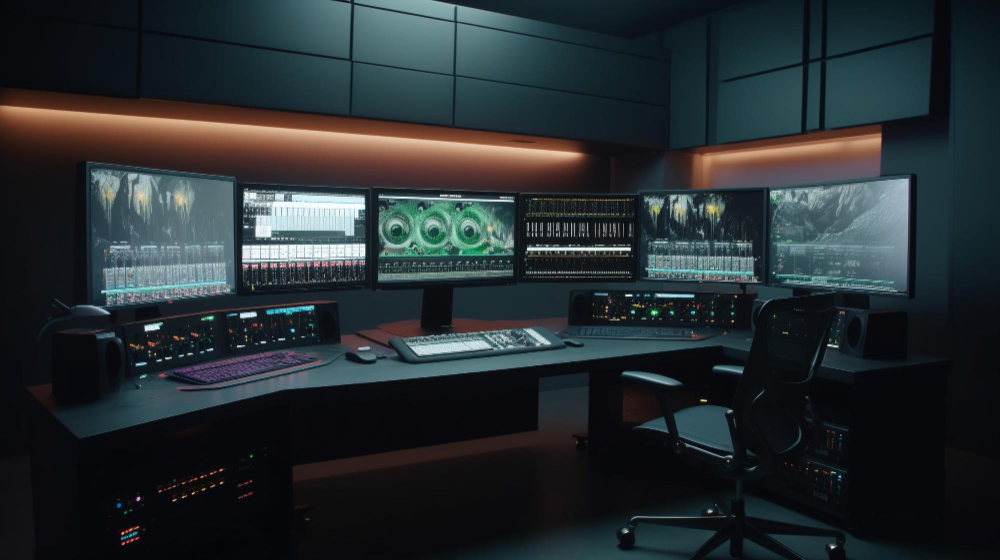Are you ready to take your music production to the next level? Then you need to understand the fundamentals of selecting the right studio monitors.
With a wide range of features and options, it can be daunting to choose the best set for your needs. By considering power and wattage, speaker driver types, cabinet considerations, room acoustics, and frequency response, you'll be able to confidently make the right choice.
So, let's dive in and explore what it takes to choose the perfect studio monitors!
Active Vs. Passive Monitors
Active monitors offer convenience and performance advantages compared to passive monitoring systems.
With active systems, you don't need to match speakers with an amplifier and crossover. Professional studios rely on active systems because of their ease of use and improved sonic performance.
In addition, active monitors have more power handling, which allows for more transient detail and precise adjustments. It's important to note that more wattage doesn't just mean more volume—it also produces more definition and dynamic range.
Moreover, active monitoring systems are typically fitted with speaker drivers made from specific materials that enhance sound quality. For the best results, focus on the application-specific benefits of the materials instead of trying to compare them.
Power and Wattage
Power handling affects the overall sound and dynamic range of a monitoring system. Higher wattage allows for more detail and precise adjustments.
When it comes to choosing studio monitors, you need to consider wattage. Music peaks can demand up to 10 times more power than average program material. So, a higher wattage will give you more definition and dynamic range, not just volume.
You'll also need to think about speaker drivers and cabinet construction, both of which can have an effect on sound. Look for application-specific benefits rather than specific materials. Be aware that ported cabinets can extend the frequency response but may sacrifice accuracy.
Placement is also key. Front-ported or closed designs offer better monitoring in certain placements.
Speaker Driver Types
Speaker driver materials have a major impact on sound, so it's important to consider application-specific benefits rather than specific materials when selecting studio monitors. Different materials can make a big difference in how your music sounds. Manufacturers are always innovating with different materials, so it's important to research what's available.
For example, lighter, rigid materials can produce faster transients and higher frequencies, while stiffer materials can produce more mid-range and lower frequencies. Also, consider the type of cabinet you need. Ported cabinets can extend the frequency response, but may sacrifice some accuracy. Front-ported or closed designs are more accurate and can work better in certain placements.
Power and wattage are also important factors to consider. Higher wattage allows for more transient detail and precise adjustments. Ultimately, choosing the right studio monitors is a matter of finding the best balance between power, speaker driver materials, and cabinet size.
Cabinet Considerations
When deciding on a cabinet, consider the room layout and placement as well as the type of cabinet.
Ported cabinets extend frequency response for more bass, but may sacrifice sonic accuracy.
Front-ported or closed designs offer more accurate monitoring in certain placements.
Here's what to keep in mind:
- • Ported cabinets can be affected by placement
- • Front-ported or closed designs offer better accuracy
- • Consider room layout and placement when choosing
- • Sonic accuracy can be sacrificed with ported designs
- • Placement can affect sonic accuracy of ported cabinets
Room Acoustics
Room acoustics play an important role in determining the sound of studio monitors. You need to make sure the room is free of any echoes or reverberations that could alter the sound of the monitors. To do this, you'll need to treat the room with acoustic foam and other soundproofing materials.
You should also consider the size and shape of the room, as this can also affect the sound of the studio monitors. In addition, the placement of the monitors should be taken into account. Be sure to place them at the correct angles and distances from each other to ensure optimal sound.
Frequency Response
Frequency response is an important factor to consider when selecting monitors. It refers to the range of frequencies that the speakers can reproduce. It is recommended to have a look at the frequency response range of your studio monitors to ensure they are suitable for your music.
Here are some other things to think about:
- • A flatter frequency response means more accurate sound reproduction.
- • The frequency range should match the musical content you are working with.
- • When selecting a frequency range, consider the room size and the type of music you will be producing.
- • It is crucial to pay attention to the bass response capabilities of the monitors.
- • For the best results, look for monitors with a wide frequency range.
Budget
Now that you've considered the frequency response of the monitors, it's time to think about budget.
It's important to remember that there is no one-size-fits-all solution, and you should be realistic about what you can afford. Don't skimp on quality just to save money, as it might end up costing you more in the long run.
Decide on a budget and stick to it. Look for features within your price range that will give you the sound you're looking for. Consider the size of the studio and the type of music you produce.
You don't have to spend a fortune to get a good set of studio monitors, but do your research and don't just buy the cheapest option.
Frequently Asked Questions
How Long Should I Use Studio Monitors For?
It depends on your needs and preferences. You should use studio monitors until you're satisfied with your sound and mix. The longer you use them, the more familiar you'll become with their sound.
What Type of Environment Is Best for Studio Monitors?
To get the best sound from your studio monitors, choose an environment with minimal noise interference and moderate temperature and humidity. Position them in a way that optimizes the sound for your particular space. Consider cabinet type, driver materials, wattage, and active vs. passive monitors.
What Is the Difference Between Active and Passive Monitors?
Active monitors have built-in amplifiers and matched performance, while passive monitors require separate amplifiers and crossovers. Active monitors offer convenience and sonic performance, while passive systems require more setup.
How Do I Know Which Studio Monitor Is Right for Me?
To choose the right studio monitor for you, consider the power and wattage, speaker driver types, and cabinet design. Think about your room layout and placement, and what type of accuracy you need.
Are There Any Maintenance Tips for Studio Monitors?
Yes! To maintain studio monitors, clean the exterior of the cabinet regularly, check speaker connections, and use a dust cover when not in use. Keep the monitors out of direct sunlight and away from heat sources. Good maintenance is important to prevent studio monitor buzzing and other damages.
Conclusion
Choosing the right studio monitors is an important process. Whether you're a beginner or a professional, it's essential to consider all factors carefully.
From active vs passive monitors to power and wattage, speaker driver types, cabinet considerations, and room acoustics, there's a lot to take in.
But if you do your research and take the time to understand each of these elements, you'll find yourself with a setup that accurately represents the music you're producing - and that's a coincidence worth celebrating!
 Follow the author Katina Vangopoulos on Twitter.
Follow the author Katina Vangopoulos on Twitter.















